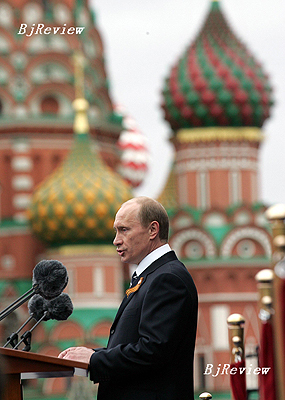
U.S.-Russia relations have reportedly hit a downward spiral since the beginning of this year. Rumors of a new Cold War are brewing as Washington and Moscow wrangle with each other over issues ranging from human rights to missile shield plans. For all the speculation, however, this dire prospect is unlikely to materialize, Chinese experts say.
"I think relations between Russia and the United States are complicated and marred by a myriad of disagreements," says Jin Canrong, Deputy Dean of the School of International Studies, Renmin University of China. "However, one thing is certain: they are not in a new Cold War at present."
Jin notes that in a Cold War, two equal rivals compete on all fronts-political, economic, diplomatic and military. Today, there are no conditions that call for a Cold War, nor do the United States and Russia have the will to start a Cold War, he says. He believes, however, that the great caution they are exercising in the course of their relations is evidence that there might be trouble: a "cold peace," to some extent.
Jin is not alone in downplaying the possibility of a new Cold War between the United States and Russia. In light of the recent developments in the two countries' relations, experts have revealed some underlying causes of this widely publicized downturn. Chen Hu, Executive Editor of World Military Affairs, states three "obvious" reasons why U.S.-Russia relations have recently been strained. "First of all, the United States insists on deploying antimissile components in Eastern Europe, a move that Russia believes will further ‘squeeze its strategic space' following the eastern expansion of NATO. Second, the United States frequently interferes in Russia's domestic affairs while fueling color revolutions (in Georgia, Ukraine and Kyrgyzstan) in its neighboring countries. Third, Russia is indignant about and openly critical of the United States' ‘unilateralism' in international affairs."
At a security conference in Munich on February 10, Russian President Vladimir Putin accused the United States of having "overstepped its national borders in every way," allegedly the most severe criticism he has directed toward the United States since he took power. In April, the United States issued two reports that could be said to contain inflammatory language. The Department of State's Supporting Human Rights and Democracy: the U.S. Record highlighted "democracy and human rights concerns" in Russia. In the Strategic Plan Fiscal Years 2007-12 of the U.S. Department of State and Agency for International Cooperation, to "push back negative Russian behavior" is listed as one of the United States' regional priorities.
U.S. Defense Secretary Robert Gates invited Russia to join its antimissile system in Eastern Europe, only to be rejected by his Russian counterpart. On April 26, Putin announced that he was suspending Russia's obligations under the Conventional Forces in Europe Treaty in response to U.S. plans for the missile defense shield in Europe. In an address on the anniversary of the defeat of Nazi Germany on May 9, Putin denounced "disrespect for human life, claims to global exclusiveness...just as it was in the time of the Third Reich." Although he did not name a specific country, analysts saw the United States as the clear target.
In an article published by People's Daily overseas edition, Chen points out that even as Russia takes a tough stance, the United States is mounting pressure on its rival. "To put it more plainly, the United States has been pressuring Russia in a systematic manner since the end of the Cold War, in its bid to deprive Russia of the Soviet Union's legacy and prevent it from reemerging as a super power," he writes. "Russia has gained national comprehensive power in recent years, as its economy revs up. It is no longer willing to subject itself to U.S. pressure."
|
